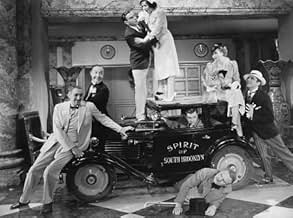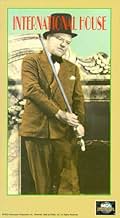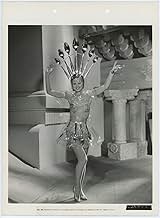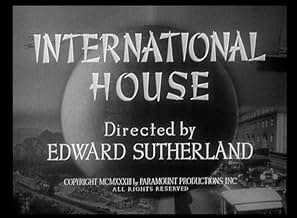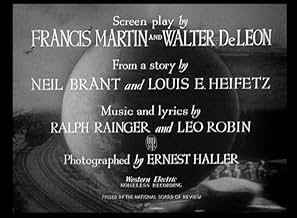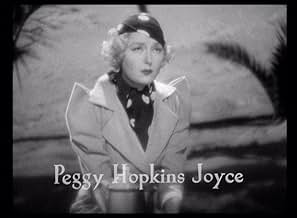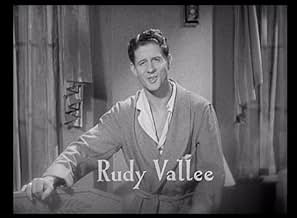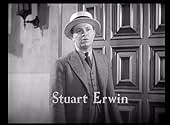NOTE IMDb
6,9/10
1,5 k
MA NOTE
Des personnages loufoques convergent vers un hôtel chinois pour enchérir sur une nouvelle invention, la télévision.Des personnages loufoques convergent vers un hôtel chinois pour enchérir sur une nouvelle invention, la télévision.Des personnages loufoques convergent vers un hôtel chinois pour enchérir sur une nouvelle invention, la télévision.
- Réalisation
- Scénario
- Casting principal
Rose Marie
- Rose Marie
- (as Baby Rose Marie)
Avis à la une
Paramount had the brilliant idea of featuring radio in the movies the previous year with The Big Broadcast. That film featured all kinds of radio stars the public only imagined and had an anarchic plot similar to International House.
I've often wondered if Paramount didn't mean to have this be The Big Broadcast of 1933 originally. Repeating from the cast of The Big Broadcast are Stu Erwin and Burns & Allen and Cab Calloway. Adding to the general hilarity are W.C. Fields, Franklin Pangborn, Rudy Vallee, Bela Lugosi, and the Paris Hilton of her day, Peggy Hopkins Joyce.
The slender thread of a plot this movie hangs on involves a Chinese inventor Edmund Breon who invents the seeing eye, radio you can see as well as listen to. Everyone wants to get their hands on this valuable patent. A lot of the musical guest stars get hooked into the film via the inventor testing out the device.
Bing Crosby made his feature film starring debut in The Big Broadcast and I wonder why his crooning rival Rudy Vallee was hired for this film. Rudy has a nice, but unmemorable number.
Of course what makes the film really go are Burns and Allen and W.C. Fields. They uplift any film they are in. George and Gracie's montypythonesque type dialog is timeless and priceless.
So is Fields of course, the eternal misanthrope. There was one bit of humor I caught in International House though that is rather dated. During that final chase scene through the International House lobby with Fields in an automobile, he pokes his head through the car roof and puts his top hat on. He then remarks something about this car used to belong to the Postmaster General.
As it turns out Herbert Hoover's Postmaster General was a rather fatuous gentlemen named Walter Brown. He liked to wear high silk hats and had a limousine designed with an extra tall roof so he could ride with his topper on. At government expense of course in the middle of the Depression. He was forever derided as High Hat Brown after that and even a year later after Hoover was out of office, W.C. Fields could wring a laugh or two with that crack from the Depression audience.
Still though, this should really be called The Big Broadcast of 1933.
I've often wondered if Paramount didn't mean to have this be The Big Broadcast of 1933 originally. Repeating from the cast of The Big Broadcast are Stu Erwin and Burns & Allen and Cab Calloway. Adding to the general hilarity are W.C. Fields, Franklin Pangborn, Rudy Vallee, Bela Lugosi, and the Paris Hilton of her day, Peggy Hopkins Joyce.
The slender thread of a plot this movie hangs on involves a Chinese inventor Edmund Breon who invents the seeing eye, radio you can see as well as listen to. Everyone wants to get their hands on this valuable patent. A lot of the musical guest stars get hooked into the film via the inventor testing out the device.
Bing Crosby made his feature film starring debut in The Big Broadcast and I wonder why his crooning rival Rudy Vallee was hired for this film. Rudy has a nice, but unmemorable number.
Of course what makes the film really go are Burns and Allen and W.C. Fields. They uplift any film they are in. George and Gracie's montypythonesque type dialog is timeless and priceless.
So is Fields of course, the eternal misanthrope. There was one bit of humor I caught in International House though that is rather dated. During that final chase scene through the International House lobby with Fields in an automobile, he pokes his head through the car roof and puts his top hat on. He then remarks something about this car used to belong to the Postmaster General.
As it turns out Herbert Hoover's Postmaster General was a rather fatuous gentlemen named Walter Brown. He liked to wear high silk hats and had a limousine designed with an extra tall roof so he could ride with his topper on. At government expense of course in the middle of the Depression. He was forever derided as High Hat Brown after that and even a year later after Hoover was out of office, W.C. Fields could wring a laugh or two with that crack from the Depression audience.
Still though, this should really be called The Big Broadcast of 1933.
INTERNATIONAL HOUSE (Paramount, 1933), directed by A. Edward Sutherland, is a minor comedy that has grown into a classic, thanks to its frequent television revivals over the last few decades, later distribution on video cassette and DVD, and classic movie cable channels, first on American Movie Classics in 1992, and then, nearly ten years later, its resurrection again, this time on Turner Classic Movies, in 2001. After all these years, this 1933 gem is still very funny.
Set in Wu-Wu, China, Doctor Wong (Edmund Breese), the inventor of the radio scope (now known as television), is staying at the International House, a luxurious hotel, where he plans to meet with representatives who want to submit bids to buy his invention. One of them is Tommy Nash (Stuart Erwin), an employer for the American Electric Company visiting China on behalf of his firm. Unable to get a train to Wu-Wu (the bridge is washed out), he decides to take his car and drive there. At the train station, he encounters Peggy Hopkins Joyce (Peggy Hopkins Joyce), who overhears his plans and talks herself into riding with Nash, in hope to also get to the International House and see this latest invention that has made news headlines. Reaching International House, Tommy locates his fiancée, Carol Fortescue (Sari Maritza), who is upset because she has learned about his lady passenger, causing friction in their relationship. Complications ensue when Tommy, who always acquires some childish diseases such as chicken pox or mumps, acquires the measles and is put in quarantine, although in reality he has only a harmless rash. But this is the way one of Nash's competitors, General Nick Petronovich (Bela Lugosi), also one of Peggy Joyce's ex-husbands, puts him away while he tries to submit a bid for the radio scope. His plan fails when the entire hotel is quarantined and Petronovich finds he is unable to return inside the hotel, forcing himself to obtain a room at a sleazy hotel across the street.
Also at the hotel are Doctor Burns and Nurse Allen (George Burns and Gracie Allen); Lumsden Hare as the confused Sir Mortimer Fortescue, Carol's father; and Franklin Pangborn as the harassed hotel manager. Nearly a half hour from the start of the story comes Professor Henry R. Quail (WC Fields), entering the hotel rooftop via his auto gyro (airplane) from Juarez, Mexico, looking for Kansas City. Since Kansas City is "lost", Quail is here to stay at International House, disrupting everything and everyone around, which leads to misunderstandings, such as Petronovich witnessing from the hotel room across the street Quail sleeping in the same room as his ex-wife, Peggy, to a wild and crazy chase that leads Quail to drive his little car around the hotel and down the fire escape. (For any Paramount movie of this sort, "Anything Goes," so don't explain logic). The Burns and Allen comedy exchanges, which are part of the storyline, succeeds in stirring up some chuckles today. And see who gets the last laugh when Fields encounters Gracie wanting his autograph.
Aside from 70 minutes of sheer comedy madness and very risqué dialog that somehow got past the censors, INTERNATIONAL HOUSE takes time for some forgettable tunes written by Leo Robin and Ralph Rainger. The first, a production number that echoes a Busby Berkeley dance routine, is "The Chinese Teacup and the Coffee Mug" (performed on the rooftop by Sterling Holloway and Lona Andre, sung by an unidentified and unseen vocalist). As Doctor Wong demonstrates his invention by trying desperately to get the Six Day Bicycle Race, the radio scope picks up famous entertainers of the day, such as Colonel Stoopnagle and Budd demonstrating their numerous inventions such as a revolving gold fish, a one dimensional alarm clock, etc., which sounds all "too peachy"; to vocalists singing songs, including "Thank Heaven for You" (sung by Rudy Vallee); "My Blue Bird is Singing the Blues" (sung by Baby Rose Marie); and "The Reefer Man" (sung by Cab Calloway and his band). All these musical interludes are brief, usually under five minutes. "The Reefer Man" was one song that suffered the TV's ax from some commercial TV stations, along with what Fields says when he finds a cat in his car, but fortunately these scenes have been restored. An instrumental song, "Look What I've Got," (introduced in a Maurice Chevalier musical, A BEDTIME STORY, 1933) is played during a hilarious scene where Fields and Joyce are preparing to take their showers and go to bed, unaware of each other's presence in the bedroom. This segment alone must be seen to be believed.
In spite of former famous Ziegfeld showgirl Peggy Hopkins Joyce obtaining top-billing in the cast, it is today acclaimed a W.C. Fields comedy. He practically walked off with the movie. At the time of the film's release, Joyce was not only well-known world wide celebrity with numerous ex-husbands, but a headliner in many circulated newspapers. Today she is virtually forgotten and her name rests in the land of the obscure. To learn more about this once famous actress, here appearing in her only talkie and final film, read the 2000 biography by Constance Rosenblum titled "Gold Digger: The Outrageous Life of Peggy Hopkins Joyce," and then go see this movie. (***)
Set in Wu-Wu, China, Doctor Wong (Edmund Breese), the inventor of the radio scope (now known as television), is staying at the International House, a luxurious hotel, where he plans to meet with representatives who want to submit bids to buy his invention. One of them is Tommy Nash (Stuart Erwin), an employer for the American Electric Company visiting China on behalf of his firm. Unable to get a train to Wu-Wu (the bridge is washed out), he decides to take his car and drive there. At the train station, he encounters Peggy Hopkins Joyce (Peggy Hopkins Joyce), who overhears his plans and talks herself into riding with Nash, in hope to also get to the International House and see this latest invention that has made news headlines. Reaching International House, Tommy locates his fiancée, Carol Fortescue (Sari Maritza), who is upset because she has learned about his lady passenger, causing friction in their relationship. Complications ensue when Tommy, who always acquires some childish diseases such as chicken pox or mumps, acquires the measles and is put in quarantine, although in reality he has only a harmless rash. But this is the way one of Nash's competitors, General Nick Petronovich (Bela Lugosi), also one of Peggy Joyce's ex-husbands, puts him away while he tries to submit a bid for the radio scope. His plan fails when the entire hotel is quarantined and Petronovich finds he is unable to return inside the hotel, forcing himself to obtain a room at a sleazy hotel across the street.
Also at the hotel are Doctor Burns and Nurse Allen (George Burns and Gracie Allen); Lumsden Hare as the confused Sir Mortimer Fortescue, Carol's father; and Franklin Pangborn as the harassed hotel manager. Nearly a half hour from the start of the story comes Professor Henry R. Quail (WC Fields), entering the hotel rooftop via his auto gyro (airplane) from Juarez, Mexico, looking for Kansas City. Since Kansas City is "lost", Quail is here to stay at International House, disrupting everything and everyone around, which leads to misunderstandings, such as Petronovich witnessing from the hotel room across the street Quail sleeping in the same room as his ex-wife, Peggy, to a wild and crazy chase that leads Quail to drive his little car around the hotel and down the fire escape. (For any Paramount movie of this sort, "Anything Goes," so don't explain logic). The Burns and Allen comedy exchanges, which are part of the storyline, succeeds in stirring up some chuckles today. And see who gets the last laugh when Fields encounters Gracie wanting his autograph.
Aside from 70 minutes of sheer comedy madness and very risqué dialog that somehow got past the censors, INTERNATIONAL HOUSE takes time for some forgettable tunes written by Leo Robin and Ralph Rainger. The first, a production number that echoes a Busby Berkeley dance routine, is "The Chinese Teacup and the Coffee Mug" (performed on the rooftop by Sterling Holloway and Lona Andre, sung by an unidentified and unseen vocalist). As Doctor Wong demonstrates his invention by trying desperately to get the Six Day Bicycle Race, the radio scope picks up famous entertainers of the day, such as Colonel Stoopnagle and Budd demonstrating their numerous inventions such as a revolving gold fish, a one dimensional alarm clock, etc., which sounds all "too peachy"; to vocalists singing songs, including "Thank Heaven for You" (sung by Rudy Vallee); "My Blue Bird is Singing the Blues" (sung by Baby Rose Marie); and "The Reefer Man" (sung by Cab Calloway and his band). All these musical interludes are brief, usually under five minutes. "The Reefer Man" was one song that suffered the TV's ax from some commercial TV stations, along with what Fields says when he finds a cat in his car, but fortunately these scenes have been restored. An instrumental song, "Look What I've Got," (introduced in a Maurice Chevalier musical, A BEDTIME STORY, 1933) is played during a hilarious scene where Fields and Joyce are preparing to take their showers and go to bed, unaware of each other's presence in the bedroom. This segment alone must be seen to be believed.
In spite of former famous Ziegfeld showgirl Peggy Hopkins Joyce obtaining top-billing in the cast, it is today acclaimed a W.C. Fields comedy. He practically walked off with the movie. At the time of the film's release, Joyce was not only well-known world wide celebrity with numerous ex-husbands, but a headliner in many circulated newspapers. Today she is virtually forgotten and her name rests in the land of the obscure. To learn more about this once famous actress, here appearing in her only talkie and final film, read the 2000 biography by Constance Rosenblum titled "Gold Digger: The Outrageous Life of Peggy Hopkins Joyce," and then go see this movie. (***)
A lot of commotion falls upon the International House hotel in Wu Hu China. Doctor Wong is planning to demonstrate a new television device and sell it to Tommy Nash, representative of the American Electric Company. Nash escorts Peggy Hopkins Joyce to the hotel as well, which makes his fiancé jealous. Also jealous is Joyce's ex-husband, Gen. Nicholas Petronovich, who is also trying to buy the invention. Gen. Petronovich tries to have Nash quarantined, but only succeeds in quarantining the hotel, with him outside the hotel. The arrival of Prof. Quail, millionaire and drunkard, creates more chaos in the hotel with his crude manners, and enrages Gen. Petronovich when he mistakenly believes Quail is sleeping with Peggy. The International House turns into madness as everyone tries to return the hotel to normal. The movie is entirely plot less, but relies on its silliness to move along, and it works. Fields is a riot drunkenly stumbling around delivering his trademark one liners. Many of the other big stars make appearances via Wong's television (Rudy Vallee, Cab Calloway, Stoopnagle and Budd). Gracie Allen's hair-brained lines have a slight logic behind them to make them funny. The movie seemed to be a bit too chaotic at times, but the chaos works in certain scenes. Rating, 7
International House is the cinematic equivalent of a root beer float: not exactly nutritious, but it sure makes you feel good. This is the kind of movie that somehow creates an atmosphere of great comedy, even when the comedy isn't so great. Of course, it helps if you enjoy flicks of the Pre-Code era, the jazz and pop of the early '30s, and performers such as W.C. Fields, George Burns & Gracie Allen, Cab Calloway, etc. (Personally I love these folks, and relish seeing them in practically anything.) Even so, you may find that some of the punch-lines fall flat, either because they're based on obscure topical references or because they weren't all that funny in the first place, or maybe because the jokes are supposed to be dumb and the dumbness itself is the joke. In the end I have to conclude that whatever success this film achieves is due almost entirely to the charisma of the larger-than-life personalities of stage, screen, and radio assembled to put the material across. I can't think of another comedy with so many dead spots and missed opportunities that is so defiantly enjoyable anyhow.
Our story concerns the demonstration of a new invention, television, in a luxury hotel in Wu Hu, China. Dr. Wong, the inventor of this device (quaintly termed a "radio-scope" here) is entertaining bids from various international companies for the rights to his invention, and the competition for this prize forms what little plot there is. Clearly, the premise is just a flimsy excuse to throw together a batch of comic skits, songs, and star turns of one sort or another. Some of the stars have lost their luster with the passage of time; the male lead is a rather unappealing comic named Stuart Erwin who was mysteriously featured in several Paramount films of the period, while the leading lady is a once-famous celebrity named Peggy Hopkins Joyce who plays herself. Joyce was a former showgirl who was better known for marrying and divorcing millionaires than for her acting skill: the Zsa Zsa Gabor of her time. Happily, however, Erwin and Joyce quickly fade into the woodwork while we enjoy the antics of the more appealing players.
There's a lot to enjoy here: Gracie Allen as the ditsy dame, hotel manager Franklin Pangborn in full fuss-budget mode, a strangely out-of-place Bela Lugosi as one of Miss Joyce's jealous ex-husbands, and of course W.C. Fields as the drunken lecher Professor Quail. I've always enjoyed Fields a great deal but must confess I have mixed feelings about his work here. Quail isn't the long-suffering Dad of It's a Gift or the lovable rogue of The Old Fashioned Way, he's sour and generally obnoxious. For me this characterization plays better in some scenes (i.e. his confrontation with Gracie) than in others (his destruction of the telephone switchboard). Fields' funniest sequence is one in which he and Miss Joyce temporarily share a bedroom suite, while each is unaware of the other's presence. I also have mixed feelings about Burns & Allen's routines on this occasion, but even when their jokes are lousy they punch 'em across with sheer panache.
Who else is at the party? Well, Cab Calloway's music is great, and his number in the uncensored version of this movie, an up-tempo tribute to marijuana called "Reefer Man," is a real jaw-dropper -- no wonder it was cut from the T.V. prints! Baby Rose Marie, already a seasoned trouper at age 10, is downright eerie belting out her torch ballad like a low-down, red hot mama. Rudy Vallee's number has always been my cue to head for the john. And then, there are a couple of lingering mysteries: why is Dr. Wong is so doggedly determined to tune-in the six-day bicycle race at Madison Square Garden? And how did the two guys who call themselves Colonel Stoopnagle & Budd get into this movie? Their brief scene is a total dud, and their appeal escapes me completely. On the other hand, that musical number with the giant teacups, Sterling Holloway, and dancers with spoons in their hair makes me feel like I've suddenly ingested hallucinogenic mushrooms. In a nice way, I mean.
If nothing else this movie has given the world a notable punch-line, the one found in my subject heading above. This, of course, is Professor Quail's immortal retort to the fussy little hotel manager when he assumes the fellow is making a pass at him. I went to a public screening of International House recently and overheard two different people quoting the line in the lobby beforehand. If you find that line funny -- and I certainly do -- then this oddball comedy may suit your palate. After all, a root beer float now and again never killed anybody.
Our story concerns the demonstration of a new invention, television, in a luxury hotel in Wu Hu, China. Dr. Wong, the inventor of this device (quaintly termed a "radio-scope" here) is entertaining bids from various international companies for the rights to his invention, and the competition for this prize forms what little plot there is. Clearly, the premise is just a flimsy excuse to throw together a batch of comic skits, songs, and star turns of one sort or another. Some of the stars have lost their luster with the passage of time; the male lead is a rather unappealing comic named Stuart Erwin who was mysteriously featured in several Paramount films of the period, while the leading lady is a once-famous celebrity named Peggy Hopkins Joyce who plays herself. Joyce was a former showgirl who was better known for marrying and divorcing millionaires than for her acting skill: the Zsa Zsa Gabor of her time. Happily, however, Erwin and Joyce quickly fade into the woodwork while we enjoy the antics of the more appealing players.
There's a lot to enjoy here: Gracie Allen as the ditsy dame, hotel manager Franklin Pangborn in full fuss-budget mode, a strangely out-of-place Bela Lugosi as one of Miss Joyce's jealous ex-husbands, and of course W.C. Fields as the drunken lecher Professor Quail. I've always enjoyed Fields a great deal but must confess I have mixed feelings about his work here. Quail isn't the long-suffering Dad of It's a Gift or the lovable rogue of The Old Fashioned Way, he's sour and generally obnoxious. For me this characterization plays better in some scenes (i.e. his confrontation with Gracie) than in others (his destruction of the telephone switchboard). Fields' funniest sequence is one in which he and Miss Joyce temporarily share a bedroom suite, while each is unaware of the other's presence. I also have mixed feelings about Burns & Allen's routines on this occasion, but even when their jokes are lousy they punch 'em across with sheer panache.
Who else is at the party? Well, Cab Calloway's music is great, and his number in the uncensored version of this movie, an up-tempo tribute to marijuana called "Reefer Man," is a real jaw-dropper -- no wonder it was cut from the T.V. prints! Baby Rose Marie, already a seasoned trouper at age 10, is downright eerie belting out her torch ballad like a low-down, red hot mama. Rudy Vallee's number has always been my cue to head for the john. And then, there are a couple of lingering mysteries: why is Dr. Wong is so doggedly determined to tune-in the six-day bicycle race at Madison Square Garden? And how did the two guys who call themselves Colonel Stoopnagle & Budd get into this movie? Their brief scene is a total dud, and their appeal escapes me completely. On the other hand, that musical number with the giant teacups, Sterling Holloway, and dancers with spoons in their hair makes me feel like I've suddenly ingested hallucinogenic mushrooms. In a nice way, I mean.
If nothing else this movie has given the world a notable punch-line, the one found in my subject heading above. This, of course, is Professor Quail's immortal retort to the fussy little hotel manager when he assumes the fellow is making a pass at him. I went to a public screening of International House recently and overheard two different people quoting the line in the lobby beforehand. If you find that line funny -- and I certainly do -- then this oddball comedy may suit your palate. After all, a root beer float now and again never killed anybody.
Certainly one of the funniest of the pre-code comedies. The premise of different bidders coming together to bid on the rights to the TV system is just an excuse to get alot of talent together, from W.C. Fields to Cab Calloway. The Burns & Allen segments are great here. That corny vaudeville shtick never worked better! Franklin Pangborn is in his element as the prissy, flustered hotel manager. God, he was hilarious! Too many great moments to try to list here. Thankfully this one is available in a great quality video and it's a shame that it isn't (yet) available on DVD (along with the other Fields Paramounts). Typical of the kinds of comedies that Hollywood (and Paramount in particular) excelled at during the Depression years. However, this one just has it all. Excellent absurd humor (Fields definitely paved the way for Monty Python and the like, believe it or not). This is not art or anything like that, don't expect a Chaplin or Keaton style film. No, this is just good, wacky fun, which is fine. If you liked INTERNATIONAL HOUSE be sure to check out the excellent Paramount comedy, MILLION DOLLAR LEGS (1932), also with W.C. Fields. This is a film with a similar vein of absurd comedy. At any rate, INTERNATIONAL HOUSE is a genuine classic comedy movie.
Le saviez-vous
- AnecdotesDuring the filming of one of W.C. Fields' scenes, a mild earthquake struck Los Angeles. The earthquake was supposedly captured on film. In the film clip, Fields and his co-stars are standing in the hotel lobby set, when the picture begins to shake as if the camera is vibrating. A chandelier on the set begins to swing back and forth, and a lamp suddenly falls over. Fields calmly ushers his co-stars off the soundstage, telling them to stay calm and walk slowly. The "earthquake footage" of Fields was played in newsreels across the country in the weeks following the 1933 quake. Nearly forty years later, however, director A. Edward Sutherland admitted that the "earthquake footage" was a hoax concocted by himself and Fields. It was done by rigging wires on the lamp and chandelier, and shaking the camera to simulate an earthquake. Sutherland claimed that he and Fields were amazed when the "earthquake footage" was accepted as genuine by newsreel distributors. "We shared a big laugh and an even bigger drink", Sutherland recalled. To this day, the fake "earthquake footage" is occasionally broadcast and accepted as genuine by entertainment television shows such as Access Hollywood (1996). The footage appeared in Hollywood Graffiti (1983).
- GaffesDuring the scene where Prof. Henry R. Quail is by his auto gyro talking to Doctor Wong and Peggy Hopkins Joyce, you can see the shadow of the boom mic moving above their heads. The boom mic then hits something, presumably the auto gyro, making a noise which makes Prof. Henry R. Quail and Peggy Joyce look up.
- Citations
Professor Quail: Hey! Where am I?
Woman: Wu-Hu.
Professor Quail: Woo-Hoo to you sweetheart. Hey Charlie, where am I?
Hotel Manager: WU-HU!
[Professor Quail removes the flower from his lapel]
Professor Quail: Don't let the posey fool you!
- ConnexionsFeatured in Oops, those Hollywood Bloopers! (1982)
- Bandes originalesShe Was a China Tea-cup and He Was Just a Mug
(1933) (uncredited)
Lyrics by Leo Robin
Music by Ralph Rainger
Sung offscreen by an unidentified man and danced by Sterling Holloway, Lona Andre,
Mary Jane Sloan, Gwen Zetter and Chorus
Meilleurs choix
Connectez-vous pour évaluer et suivre la liste de favoris afin de recevoir des recommandations personnalisées
- How long is International House?Alimenté par Alexa
Détails
- Durée1 heure 8 minutes
- Couleur
- Rapport de forme
- 1.37 : 1
Contribuer à cette page
Suggérer une modification ou ajouter du contenu manquant

Lacune principale
By what name was International House (1933) officially released in India in English?
Répondre

